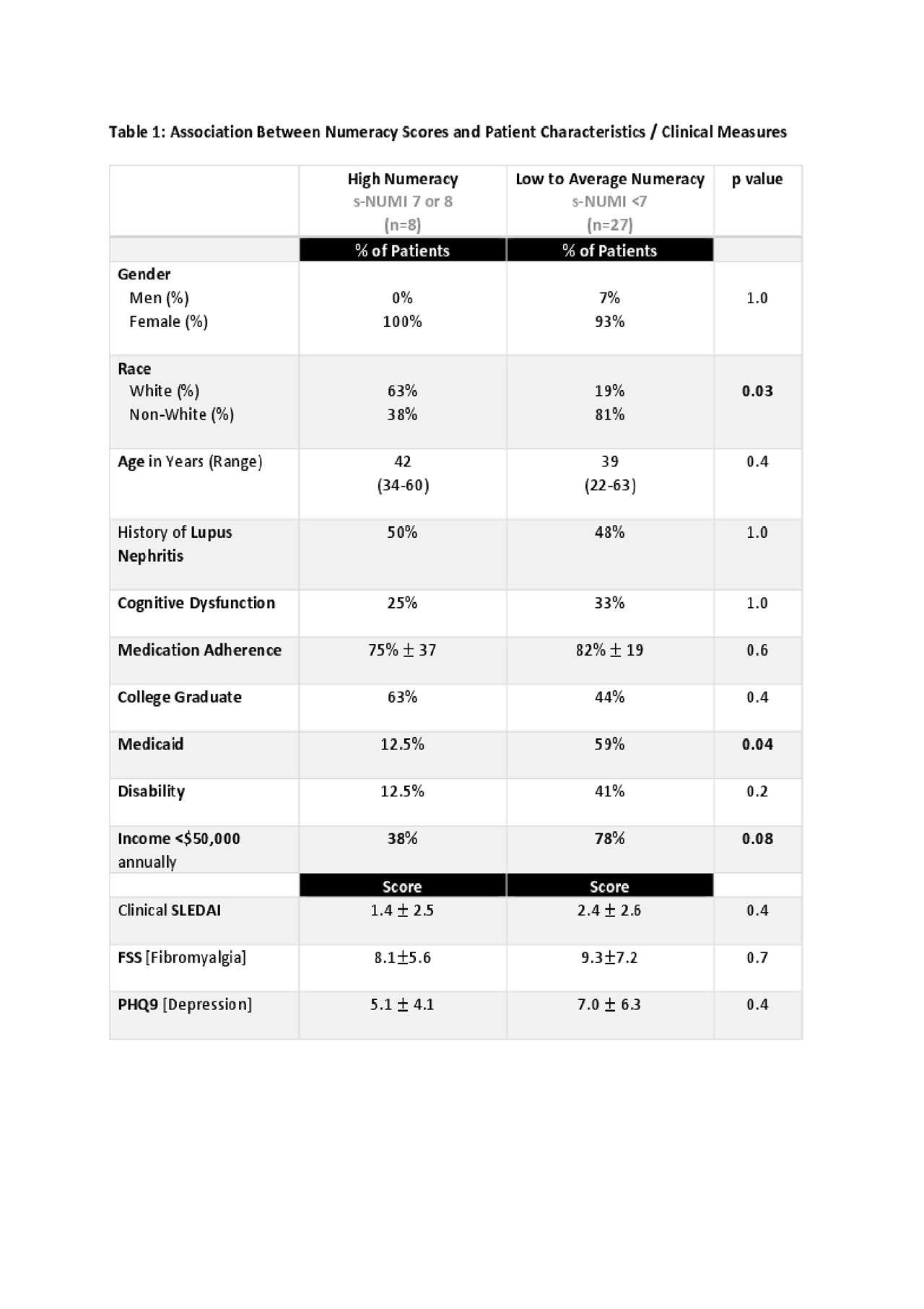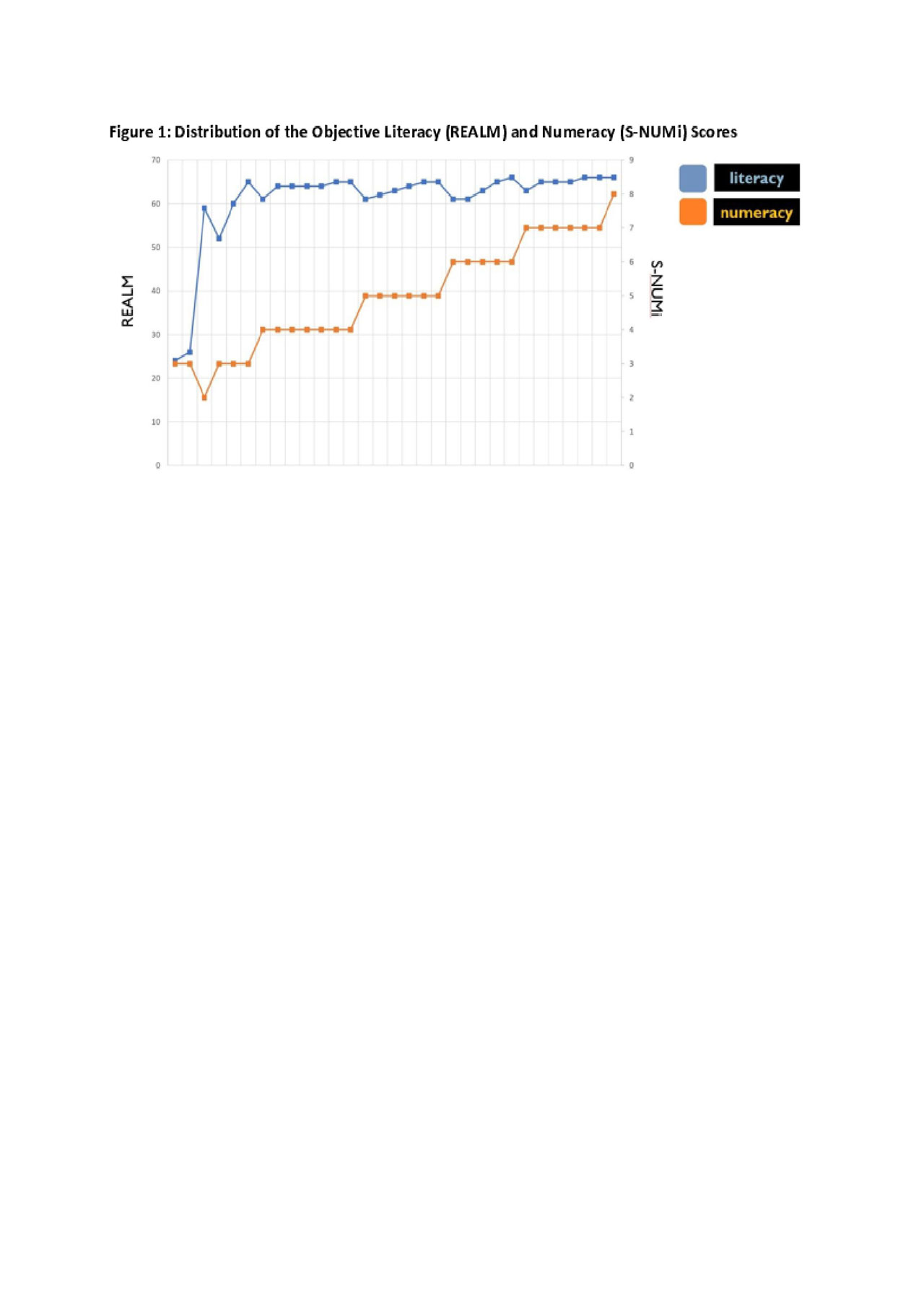Session Information
Session Type: Poster Session (Monday)
Session Time: 9:00AM-11:00AM
Background/Purpose: Up to 50% of American adults have basic or below basic health literacy and numeracy. Low health literacy is associated with increased health care costs and hospitalization rates as well as poor disease knowledge and self-management. Health numeracy is a form of quantitative health literacy with important implications on health. While studies have demonstrated the impact of low health literacy on patient outcomes in many diseases including rheumatoid arthritis, there is no recently published data investigating literacy and numeracy in SLE. The objectives of this study were to (1) assess baseline health literacy and numeracy of our SLE cohort and (2) evaluate clinical associations.
Methods: SLE patients in a university clinic meeting SLICC criteria from March through May 2019 were recruited. Health literacy was assessed using the Basic Health Literacy Screen (BHLS), Rapid Estimate of Adult Literacy in Medicine (REALM) and the Arthritis-Adapted REALM (A-REALM). Health numeracy was evaluated using the Shortened Subjective Numeracy Scale (SNS-3) and the Numeracy Understanding in Medicine Instrument Shortened Version (S-NUMi). Fisher’s exact test was applied to categorical variables using STATA Version 15. The associations between health literacy and numeracy with clinical variables were analyzed using univariate and multivariate models.
Results: The study included 35 patients with SLE with an average age of 39 years, 94% were high school graduates and 49% college graduates, 69% had annual income < $50,000, and 71% were non-white. SLE disease duration averaged 14 years and current average clinical SLEDAI was 2.1. The majority of patients scored in the high school range for literacy (86% with REALM ≥ 61) and self-reported good reading skills (BHLS mean 13.2 [SD 2.5] out of 15). On the other hand, only 23% of patients scored in the high range for numeracy, and patients reported lower subjective math self-evaluation scores (SNS-3 12.5 [SD 4.3] out of 18).
Compared to patients with high numeracy, patients with a s-NUMI score consistent with average or low numeracy were more likely to be black, have significantly lower income or have Medicaid insurance (Table 1). There was not an association between numeracy and prior lupus nephritis, current lupus activity, self-reported medication adherence, or current pain, fatigue or depression; however, the study was under-powered to identify these differences. Interestingly, self-reported cognitive dysfunction was not different between groups.
Conclusion: In our study, the majority of SLE patients scored at the high school range for health literacy (86%) compared to only 23% demonstrating high numeracy scores. Our clinical experience suggests that patient understanding of lupus manifestations and treatment is not reflected in the high literacy scores found in this study. We hypothesize that a patient’s ability to read words, as is tested in the REALM and A-REALM, is not sufficient to assess understanding of the complexity of SLE. Further studies are needed to investigate the impact of literacy and numeracy on disease understanding and medication adherence.
To cite this abstract in AMA style:
Maheswaranathan M, Whitney R, Clowse M, Eudy A, Rogers J. Investigating Health Literacy and Numeracy in an Academic Center Lupus Cohort [abstract]. Arthritis Rheumatol. 2019; 71 (suppl 10). https://acrabstracts.org/abstract/investigating-health-literacy-and-numeracy-in-an-academic-center-lupus-cohort/. Accessed .« Back to 2019 ACR/ARP Annual Meeting
ACR Meeting Abstracts - https://acrabstracts.org/abstract/investigating-health-literacy-and-numeracy-in-an-academic-center-lupus-cohort/


